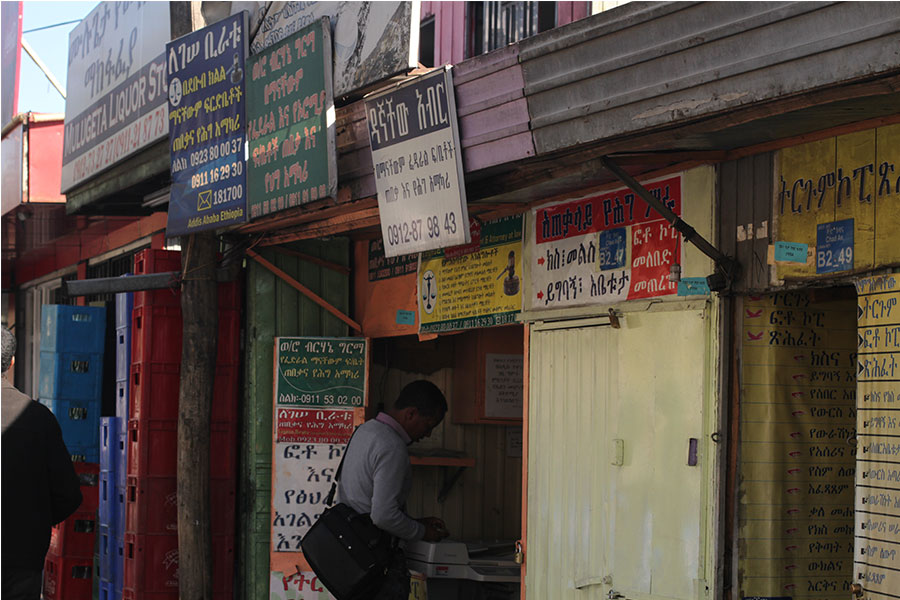
Radar | Dec 21,2019
A corridor in the building of the Education Ministry, which is entrusted with a mammoth value and mission, once witnessed a strenuous debate between two friends. They were university students working there during their summer breaks. The sage Education Minister observed the unceasing wrangle that ensued over lunch and came out of his office to learn what was going on between the students.
Then, unusual for its day as it is now, he joined the two friends for an open dialogue. He realised that they were arguing about a past historical event, the revolution of 1974, which unseated Emperor Haileselassie and ended the monarchy. He instantly referred them to the library, where they would have all the answers, as a book about the historical event was put aside there.
The episode came to my mind when I went to the only book store in our neighbourhood. I bought some works of fiction written in Amharic by the day’s writers. I was motivated to buy some of them as I noticed changes in character development, pacing and writing techniques. Yet, as I was lamenting about the dire absence of quality editors and creative “lying” in written fiction with creative inspirations for every walk of life, I found books on many fields, say science or technology, with more biographical flavours. It is to be expected. People have an easier time reading a biography about Karl Marx, which also helps them learn about socialism, than diving into Das Kapital. The former is more relatable as it would be less academic.
This is all the more critical as it is hard to conserve history about a particular time. Many books are deficient in their sharp portrayals of the day’s society that is laced with brilliant observation. Many fail to survive current political temperatures and are too biased to serve more than as a complement to history learned from somewhere, thus not worth putting in a library.
Then, the bookseller told me the arrival of an autobiographic book, recounted by one of the senior officials during the Dergueregime. It was good news, though every addition of an autography is a stark reminder of the few we have and the too many missing, as many of us lack either the will or the time to write one, which could have served as generations link through books. That is without the need to mention the ever-present tension between the portrayal of the self and self-aggrandisement, and facts and interpretation in recounting personal achievement.
Though I had to skip other commitments, I finished the book without any respite. The book was reminiscent of the 18th century, most evident with James Boswell’s The Life of Samuel Johnson, the great English man of letters, who recorded in detail Johnson’s words and activities over the period he knew him. He shined in the reflected glory of his great portrait, as witnessed by one writer, ending up being an epitome of writing the biography, to an extent that to ”boswellise” means to write a biography in the same intimate and faithful manner as Boswell. The same could be said of the autobiographical book by the Dergueofficial, although it was the same person reflecting on his own personal story.
I hope two friends from a future generation will have a range of witty and clever reads in their library, from creative writings, essays and boswellised biographies. To build the future, one does not only need the past; they need a faithful telling of it and an honest interpretation.
PUBLISHED ON
Aug 14,2021 [ VOL
22 , NO
1111]


Radar | Dec 21,2019

Radar | Oct 12,2024

Fortune News | Jul 18,2021

Viewpoints | Apr 17,2021

Radar | Aug 01,2020

Sponsored Contents | Apr 04,2022

My Opinion | Jun 25,2022

Radar | Oct 10,2020

Radar | Jul 23,2022

View From Arada | Jan 12,2019

Dec 22 , 2024 . By TIZITA SHEWAFERAW
Charged with transforming colossal state-owned enterprises into modern and competitiv...

Aug 18 , 2024 . By AKSAH ITALO
Although predictable Yonas Zerihun's job in the ride-hailing service is not immune to...

Jul 28 , 2024 . By TIZITA SHEWAFERAW
Unhabitual, perhaps too many, Samuel Gebreyohannes, 38, used to occasionally enjoy a couple of beers at breakfast. However, he recently swit...

Jul 13 , 2024 . By AKSAH ITALO
Investors who rely on tractors, trucks, and field vehicles for commuting, transporting commodities, and f...

Jul 12 , 2025
Political leaders and their policy advisors often promise great leaps forward, yet th...

Jul 5 , 2025
Six years ago, Ethiopia was the darling of international liberal commentators. A year...

Jun 28 , 2025
Meseret Damtie, the assertive auditor general, has never been shy about naming names...

Jun 21 , 2025
A well-worn adage says, “Budget is not destiny, but it is direction.” Examining t...